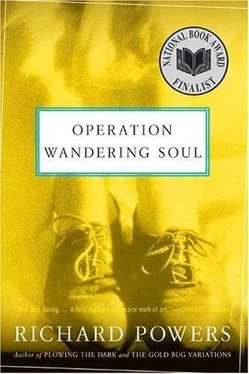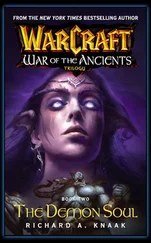Richard Powers - Operation Wandering Soul
Здесь есть возможность читать онлайн «Richard Powers - Operation Wandering Soul» весь текст электронной книги совершенно бесплатно (целиком полную версию без сокращений). В некоторых случаях можно слушать аудио, скачать через торрент в формате fb2 и присутствует краткое содержание. Год выпуска: 2002, Издательство: Harper Perennial, Жанр: Современная проза, на английском языке. Описание произведения, (предисловие) а так же отзывы посетителей доступны на портале библиотеки ЛибКат.
- Название:Operation Wandering Soul
- Автор:
- Издательство:Harper Perennial
- Жанр:
- Год:2002
- ISBN:нет данных
- Рейтинг книги:5 / 5. Голосов: 1
-
Избранное:Добавить в избранное
- Отзывы:
-
Ваша оценка:
- 100
- 1
- 2
- 3
- 4
- 5
Operation Wandering Soul: краткое содержание, описание и аннотация
Предлагаем к чтению аннотацию, описание, краткое содержание или предисловие (зависит от того, что написал сам автор книги «Operation Wandering Soul»). Если вы не нашли необходимую информацию о книге — напишите в комментариях, мы постараемся отыскать её.
Operation Wandering Soul — читать онлайн бесплатно полную книгу (весь текст) целиком
Ниже представлен текст книги, разбитый по страницам. Система сохранения места последней прочитанной страницы, позволяет с удобством читать онлайн бесплатно книгу «Operation Wandering Soul», без необходимости каждый раз заново искать на чём Вы остановились. Поставьте закладку, и сможете в любой момент перейти на страницу, на которой закончили чтение.
Интервал:
Закладка:
Kraft makes ready to bolt at the monosyllable. In point of fact, he has bolted already, silently gone, back on call. "You do it for me, will you?" Just this one thing. For my sake. For God's sake. Slip her a children's book, for once, while she's not looking.
Has read them all once, time was, several lives ago. Thumbed his way about in, climbed down through the portable portals, every one an infallible Blue Guide to a parallel place, unsuspected, joining the town and just at hand. Maybe's municipalities are always: the illustrated pastel covers deliver this shocking evidence to his cortex's tangled bit-bundle as he handles the books again. Immediate, closer even than the known, so close he must have constantly stumbled over the entryways without seeing. Children are forever falling through, almost by accident. Right there. Over the high hedge. A dead drop out the nursery window. Behind the heavy wall hanging. Just inside the next pastel binding.
They were, by all accounts, places much like the place he inhabited, the one you were supposed to play, wait, work, grow up, or lose yourself in. They doubled reasonably for the land at large except with one rule tweaked, one natural law finally understood for all it implied. There, everything would be exactly the same, everything except perhaps that aging would turn out to be a myth, disease vastly overrated, time a steady state, and thoughts real.
Adults, de facto, could neither locate nor recognize the layout. This followed tautologically. Once naturalized and issued a green card, once lured into believing in the possibility of a long stay, once you'd accepted the terms of lease, just the idea of going abroad on speculation became too ruinously expensive. To have an address here embargoed trade with dislocation's private provinces. But to a child brought up on customs checks and absentee ballots, to a reduced fare in terminal transit, to a boy raised on tales of a blessed country unreachable except by eternal detours through every makeshift sultanate that ever swabbed the upper decks of the General Assembly, these secret gardens and lost domains, these accounts of wonder- and neverlands were simple extensions, travel brochures from sovereign states just past the next Passport Control.
Hidden valleys were commonplaces to a boy who had been twice around the world before breaking his first bone. (The bone was a clavicle, cracked in a fall from a jackfruit tree that he had scaled in a doomed attempt to spy out the Nicobar Islands from the Indian mainland. He came to consciousness two days later in a field hospital bed, clutching a regiment of his beloved toy Gurkhas.) His parents moved every couple dozen months, whether they needed to or not. They took large leaps in small integer multiples of time. The boy always moved with them, deferring to their wishes as in most incidental matters.
In such a life, the roll of real places was as mysterious as the secret, stowaway locales his books laid out. Until the age of eight, Ricky nursed the impression that his father worked for some multinational oil company. He held on to that orienting fiction long after the evidence failed to add up. For another few years, just before adolescence set in in earnest, he was content to tell people that the man was with the Foreign Service. After that it was Air America, or "I don't know." Then the topic simply stopped coming up.
Whatever the name of his father's true employers, they demanded frequent and radical relocation. Each time that the family struck the set, dismantled the current household, and loaded it into shipping crates, reading excitement came and riffled the boy again, awakened by the standard hopeful anxiety of being left behind in the shuffle. He would find it for good this time — the wayward path, the wandering door that had somehow blended in invisibly with the surrounding grass and stone.
Veteran repacking campaigns left him a quiet child, capable of sitting still for endless, uprooted stretches. If he could live through the tedium of reaching the next stopover, he might recognize the new place on arrival, instantly find his way, the way that both imagination and his biannually decimated library swore existed. The next stopover never lay along the usual picnic routes given in the Michelins. The year in Seoul and the six months in Buenos Aires were mainstream compared to a few of the more remote refueling overnighters that made the family checklist.
He was an only child, the lone ward in his parents' caretaker government. Little Ricky had already come across, in bed, by flashlight, years ahead of the event, accounts of what would become of the folks: taken by cholera up in the Punjab. Pricked by a hail of cassava-tipped arrows. Swept from ship's deck by unseasonable eagerness on the part of the Pacific south equatorial. They would either return a lifetime later with tales of a strange inheritance or they would not: the books were reticent and divided on this matter.
His parents made up for his isolation by sending him through a slew of international schools. Sometimes private tutors would catch him up to the levels of learning in the local time zone. Schools too various to keep track of arrived new every year or two. These drilled him in all the lessons of peer terror, violent schoolground rivalry, and systematic spiritual search and seizure. Yet the one great payoff of continuous upheaval was that every two years it wiped the slate clean. Thus he acquired all the lessons, with none of the long-term liabilities, of human contact.
In every new temporary home, he was allowed all the books he could amass. But by the end of the stay, at the next inevitable move, the boy had to pare back his library to fit into one packing crate. Toys, of course, accompanied him along the way: when very young, a small, weight-driven walking cow that he let traipse over a cliff in the Andes. When slightly older, a View-Master with a handful of reels that brought the death of Pope John XXIII into vivid 3-D. In some countries the family compound was overrun by house and yard pets: one-eyed dogs, a sadistic gibbon that swooped down to attack from the roof of the servants' quarters, a myna bird that he taught to shout "Burglars!" in three languages.
His own myna mastery of the regional dialect would appear within weeks of arrival. By steeping and imitation, he'd start to jabber with the new round of street vendors in an innocent and indiscriminate mix of Farsi, Korean, Urdu, and bastard lingua franca Carib, jumbling and enjambing words, forgetting where each came from and where in the world each might successfully be used.
Terms appeared of themselves, even in conversation with his parents. (Even as an adult, he sometimes dreamed in words that were lost to conscious recall.) French was frequently helpful, but with so many obvious mother-tongue cognates, it was too trivial to be considered foreign. He could count to a hundred in three different Chineses, could pray without comprehension in Arabic, and could swear sufficiently to get himself hanged from multiple major branches of speech's tree.
Once, they did accidentally stumble upon an entrance to the Alongside. Puberty had not yet hit him in earnest, and so he was still clear enough to recognize at once the most beautiful city he'd ever seen. Geography had been absurdly generous with the setting. The city arose from an arena of hard stone as white as bleached sheets, the perfect material for raising pure linen towers next to a turquoise sea. A naturally protected port made it a prime spot for jumping off from, a base for thirty centuries of enriching trade.
A bracing, crystal climate left the city in year-round early summer. The air contained antidotes for most debilitating infections. Food spilled off trees and animal flanks into markets that sprouted everywhere in a pristine street maze. Ricky could sit for entire afternoons in the piled-up terraces among idle ancients. The men would drag lazily on their water pipes and keep the boy in fizzy drinks and figs so long as he would sit and listen to stories of rocs and roving thief bands and sunken Phoenician ships long overripe for salvage.
Читать дальшеИнтервал:
Закладка:
Похожие книги на «Operation Wandering Soul»
Представляем Вашему вниманию похожие книги на «Operation Wandering Soul» списком для выбора. Мы отобрали схожую по названию и смыслу литературу в надежде предоставить читателям больше вариантов отыскать новые, интересные, ещё непрочитанные произведения.
Обсуждение, отзывы о книге «Operation Wandering Soul» и просто собственные мнения читателей. Оставьте ваши комментарии, напишите, что Вы думаете о произведении, его смысле или главных героях. Укажите что конкретно понравилось, а что нет, и почему Вы так считаете.












